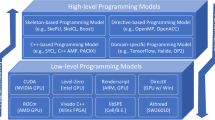Abstract
In the past few months, the world has witnessed the impressive pace that the microprocessor chip vendors’ switching to multi-core chip technology. However, this is preventing steep software challenges – both in the migration of application software and in the adaptation of system software.
In this talk, we discuss the challenges as well as opportunities facing software technology in the era of the emerging multi-core chips. We review the software effort failures and lessons learned during the booming years on parallel computing – in the 80s and early 90s, and analyze the issues and challenges today when we are once more trying to explore large-scale parallelism on multi-core chips and systems. We then predict major technology innovations that should be made in order to assure a success this time.
This talk will begin with a discussion based on our own experience on working with fine-grain multithreading from execution/architecture models, system software technology, and relevant application software studies in the past decade. We then outline our recent experience in working on software issues for the next generation multi-core chip architectures. We will present a case study on a mapping of OpenMP on two representative classes of future multi-core architecture models. We discuss several fundamental performance issues facing system software designers.
Similar content being viewed by others
Author information
Authors and Affiliations
Editor information
Editors and Affiliations
Rights and permissions
Copyright information
© 2006 Springer-Verlag Berlin Heidelberg
About this paper
Cite this paper
Gao, G.R. (2006). The Era of Multi-core Chips -A Fresh Look on Software Challenges. In: Jesshope, C., Egan, C. (eds) Advances in Computer Systems Architecture. ACSAC 2006. Lecture Notes in Computer Science, vol 4186. Springer, Berlin, Heidelberg. https://doi.org/10.1007/11859802_1
Download citation
DOI: https://doi.org/10.1007/11859802_1
Publisher Name: Springer, Berlin, Heidelberg
Print ISBN: 978-3-540-40056-1
Online ISBN: 978-3-540-40058-5
eBook Packages: Computer ScienceComputer Science (R0)




